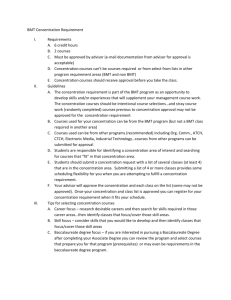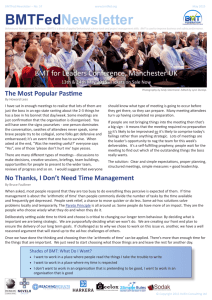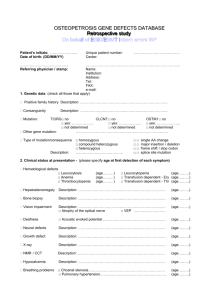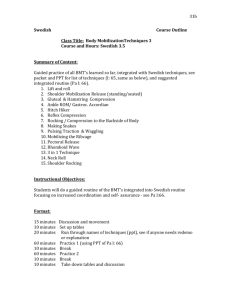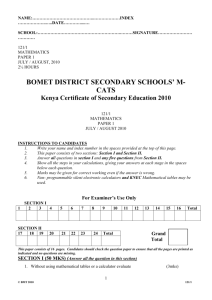Why Participate in Business Management Training
advertisement
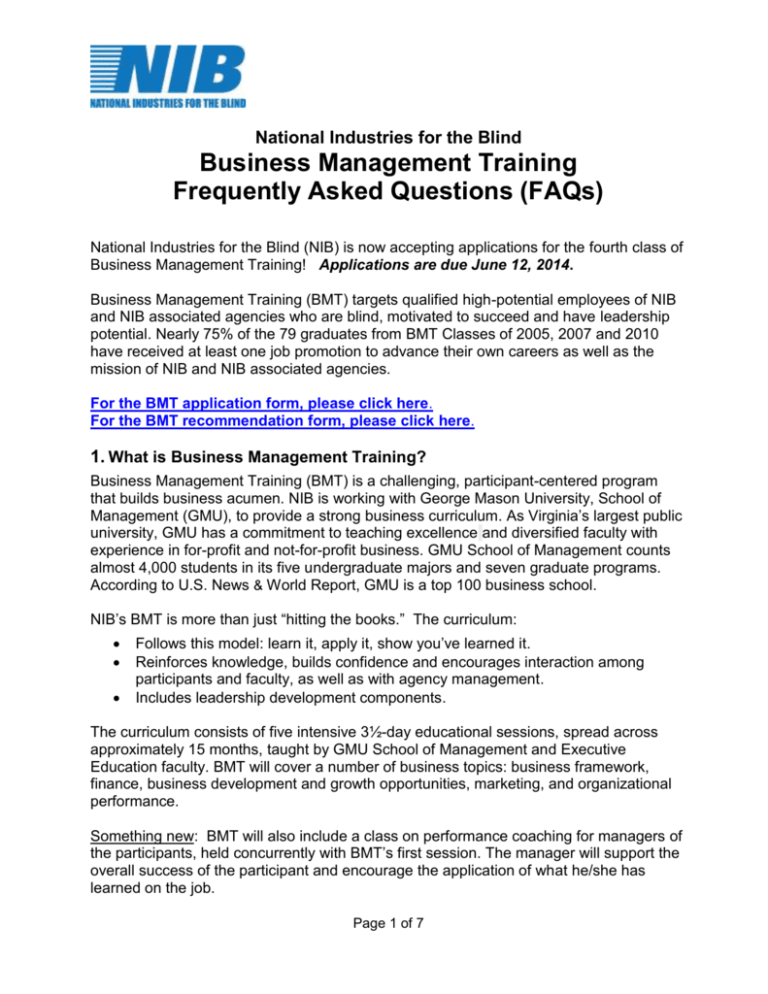
National Industries for the Blind Business Management Training Frequently Asked Questions (FAQs) National Industries for the Blind (NIB) is now accepting applications for the fourth class of Business Management Training! Applications are due June 12, 2014. Business Management Training (BMT) targets qualified high-potential employees of NIB and NIB associated agencies who are blind, motivated to succeed and have leadership potential. Nearly 75% of the 79 graduates from BMT Classes of 2005, 2007 and 2010 have received at least one job promotion to advance their own careers as well as the mission of NIB and NIB associated agencies. For the BMT application form, please click here. For the BMT recommendation form, please click here. 1. What is Business Management Training? Business Management Training (BMT) is a challenging, participant-centered program that builds business acumen. NIB is working with George Mason University, School of Management (GMU), to provide a strong business curriculum. As Virginia’s largest public university, GMU has a commitment to teaching excellence and diversified faculty with experience in for-profit and not-for-profit business. GMU School of Management counts almost 4,000 students in its five undergraduate majors and seven graduate programs. According to U.S. News & World Report, GMU is a top 100 business school. NIB’s BMT is more than just “hitting the books.” The curriculum: Follows this model: learn it, apply it, show you’ve learned it. Reinforces knowledge, builds confidence and encourages interaction among participants and faculty, as well as with agency management. Includes leadership development components. The curriculum consists of five intensive 3½-day educational sessions, spread across approximately 15 months, taught by GMU School of Management and Executive Education faculty. BMT will cover a number of business topics: business framework, finance, business development and growth opportunities, marketing, and organizational performance. Something new: BMT will also include a class on performance coaching for managers of the participants, held concurrently with BMT’s first session. The manager will support the overall success of the participant and encourage the application of what he/she has learned on the job. Page 1 of 7 2. Why participate in Business Management Training? Reasons to participate in BMT: Gain business knowledge and critical thinking skills with motivated and talented peers. Improve on-the-job performance – contribute new skills to your organization. Learn the big-picture perspective of business operations and how to be solutionsoriented. Build the capacity of your agency and NIB’s network of associated agencies as a whole. Enhance your eligibility to expand your present position, grow into a leadership position and advance your career. Earn a certificate of completion in business management from a university and continuing professional education credits. 3. Am I eligible for Business Management Training? Approximately 20 high-potential employees of NIB and NIB’s associated agencies, who are blind and motivated to succeed as well as demonstrate leadership potential, will be selected through a competitive application process – they should demonstrate leadership potential, should also meet the following eligibility requirements: Proficient in the use of Microsoft Office Suite, particularly MSWord, Excel, Outlook, and Internet. Basic PowerPoint skills will be useful. Masterful in the use of assistive technology. Mastery level preferred. Able to effectively use a laptop and note-taking tools during BMT sessions. Skilled as a learner – able to study and gain knowledge through pre-reading materials. Familiar with fundamental business terminology and operations. Demonstrating business, management and leadership skills while already performing jobs that are getting you in line for leadership positions at NIB or within the network of NIB associated agencies. Ability to fully participate in all five BMT sessions, including study of all pre-session materials and participating in the team project work. BMT participation begins before session one and continues between sessions, not just in the classroom. BMT is designed to prepare people who are blind for ever-increasing levels of responsibility and positions in management as per the mission of NIB; therefore, preference will be given to those individuals meeting this criterion. Should seats become available, high-potential members of agency and NIB management teams who are not blind will be considered on a tuition basis. Page 2 of 7 4. What is the teaching style? The BMT curriculum follows a successful model: learn it, apply it, show you’ve learned it. Participants are learners not just trainees, reflecting and applying new information and building skills to take on the challenges presented during this program and on the job. BMT participants learn how to think through solutions and analyze tough business issues to develop a business framework within which to apply their own critical thinking and business judgment. Participants learn through the case-study method, faculty-guided discussions, and interaction with fellow students. Concepts are applied to real-life scenarios to further enhance skills. There will be participant-faculty interaction, including mentoring and coaching. Participants will also work in special project groups, putting freshly-honed skills to work in a non-classroom setting. Participants experience team building, test leadership skills and practice business judgment. Teams will deliver presentations at the end of each session. Pre- and post-session reading assignments, special project work and team conferencing keeps class members engaged prior to the first session and between each of the remaining sessions. Participants use the time between sessions to complete assignments, incorporate feedback on special project presentations and prepare for the next session. 5. How much time will it take? Materials and assignments are provided about four weeks prior to each session because each participant’s pace of learning varies. Preparation time can be divided into three categories: 1. Prior to Each BMT Session. For each week’s session, there will be readings on various business topics and case studies, and this reading and preparing for the classroom discussions can take from 10 to 25 hours to accomplish. Participants will be assigned reading that will need to be done for each day of the week-long session. 2. During BMT. While participants are at BMT, they will need to review and refresh their minds before classroom discussions begin. Participants will need to find time during the day or at night to review materials and notes again before each day commences – this might take 1 to 2 hours. 3. Teams. Project and team work will be carried out between as well as during the BMT sessions. The time spent on team work is highly variable and some teams have spent as much as 30 hours between BMT sessions. Each person will research topics, collect data and organize information for the team project. Team members will collaborate with others in their group through phone calls and emails, as well as work with mentors, resource contacts and faculty between sessions and during each BMT session. Page 3 of 7 Participants and agency management will need to determine how to best handle BMT’s workload, hopefully with consideration to the suggestions provided in question #7 below. 6. What is expected? Participants are responsible for completing the pre-session and during-session study assignments, classroom participation, extra-curricular projects, web-based and telephone interaction and logistics. During each of the five BMT sessions, participants experience a rigorous, full-day training schedule and attendance is required. Applicants for BMT should be: A. A high-potential employee in good standing with an excellent service record. B. Interested in a business career and leadership at NIB or an associated agency. C. Proficient in the use of Microsoft Office Suite, particularly MSWord, Excel, Outlook, and Internet. Basic PowerPoint skills will be useful. D. Masterful in the use of assistive technology. Mastery level preferred. E. Able to effectively use a laptop and note-taking tools during BMT sessions. F. Able to access the Internet via a high-speed connection on a reliable computer. G. Prepared to travel independently for a week at a time, five times over two years H. Skilled as a student – preferably you have attended classes in an academic setting and know how to prepare for classroom discussions. I. Able to carry out all pre-reading and activities outside of the on-site training sessions and able to spend time preparing before and between training sessions. J. Willing to participate fully in classroom discussions, break-out sessions, and teamwork, giving your full interest, effort and support throughout the program. K. Participate in the “between sessions” activities, such as on-line discussions and coaching. L. Practice what was learned in BMT when you get back on-the-job. M. Complete program administration tasks on time, such as program evaluations, travel arrangements, forms, and the like. Participation by the applicant’s manager is another expectation. The managers participate in a coaching class to learn skills that will help them guide the participant. They must be available to travel to the Washington, D.C. area for the first session. These managers are required to participate in the 1½-day coaching course and carry-out all the assignments at the workplace throughout the program. An alternate coach is possible when the manager is unavailable. If selected, participants will need access for 15 months to a computer that has the appropriate assistive technology, e-mail capability, and Internet readiness. Each participant should have their own laptop computer to use onsite (or the ability to borrow one during the program). Page 4 of 7 7. What are some best practices for participants and their home agencies? Employing the following best practices will ensure the best return on the time and energy required of BMT participants. The following suggestions were gleaned from participants and CEOs from previous BMT classes. Basics: Applicants from NIB associated agencies must have the active support of their immediate supervisor, as well as the commitment from agency leadership. NIB employees must have active support of the supervisor and commitment from the Leadership Team member overseeing the department. Coaching: The role of the manager is vital to the achievement of any business goal and particularly to the success of the participant. The coach manager relays the importance and seriousness of accepting the BMT challenge and sets/resets high expectations to excel. Coaches will partner with the participant for success in terms of learning and application on the job. Cost: Any costs that are not covered by BMT should be discussed, determining expenses to be covered by the agency. Ideally, the participant’s wages should continue while attending BMT, and the time away should be considered administrative leave. Study Time: Allow time to study during the work day – anywhere from 5-15% of a 40hour work week. Participants also should expect to study on their personal time throughout the 15-month program. Participants must make time to take part in occasional conference calls or phone calls to team members. Mentoring: There should be opportunity to meet with and ask questions of agency management who work in the topics being studied. A few ideas: o Meetings with agency CEO and other leadership about agency business issues and careers reinforce value and encourage continued learning. o After each BMT session, a 15-20 minute presentation to the agency management team about what was learned, insights and recommendations is strongly suggested. o Agency leadership and management should encourage and reinforce new learning and skill development of the participant after each week-long session. 8. Where will Business Management Training be located? BMT takes place in the Washington, D.C. area. Participants attend the sessions with GMU faculty all day, Tuesday through Friday. Exact location, dates and schedules will be provided to participants once student selection has been made. Participants must be available to travel to Washington, D.C., for each session throughout the 15-month program. Participation in all five sessions is required to complete the Page 5 of 7 business curriculum and receive certification. Lodging and group meals will be provided, and participants will coordinate travel with NIB. 9. When does Business Management Training begin? The first BMT session will begin Tuesday, September 23, 2014 and adjourn at noon on Friday, September 26, 2014, opening with a group dinner on Monday, September 22nd. BMT participants are required to attend all five BMT sessions: Session #1 – September 22 – 26, 2014 Understanding Business Strategy and Frameworks for Business Development September 22 – 24, 2014 (the manager of each BMT participant will attend a coaching course) Session #2 – December 8 – 12, 2014 Finance and Performance through Financial Management Session #3 – March 16 – 20, 2015 Core Business Action: Aligning Development, Operations and Marketing Session #4 – June 8 – 12, 2015 Growing the Business: Markets, Customers and Growth Opportunities Session #5 – September 14 – 19, 2015 Leadership for Personal, Team and Organizational Performance 10. What does it cost? NIB covers the following costs for the BMT participant: Instructors and training materials Classroom facility Travel to a Washington, D.C. airport or train station Lodging Group meals Please note, participants and their agencies should anticipate minor costs (e.g., ground transportation, individual meals and other incidental personal expenses) that will not be covered by NIB. NIB covers the following costs for the coaches: Instructor and training materials Classroom facility Group meals Please note that NIB is asking the managers of BMT participants and their agencies to cover travel and lodging which encompasses one trip to the Washington, D.C. area and two nights lodging at the hotel selected for BMT. Given the current business climate, we Page 6 of 7 are asking for this consideration; however, if this request results in a hardship that would prevent an eligible BMT candidate from attending, please let us know. As BMT is designed for people who are blind, a one-time reduced-tuition payment of $10,000 for the five-session BMT program will be charged for participants who are not blind. Also, if selected as BMT participants, they will be responsible for the cost of transportation to and from Washington, D.C. for each session as well as lodging and other incidentals as mentioned above. More specific information regarding detailed logistics will be provided to all participants once they have been selected and confirmed 11. How do I apply for Business Management Training? The BMT application process opened May 1, 2014. Applications will be accepted until June 12th via email at bmt@nib.org. Participants will be notified of their status in early July, approximately two months before the first session begins. All applications must include: Completed application form Completed recommendation form Applicant’s resume Applicant’s job description If the applicant is an employee of NIB, the recommendation for needs to come from the supervisor and the member of the leadership team member heading the department. For the BMT application form, please click here. For the BMT recommendation form, please click here. For questions, please contact Karen Pal, Business Leaders Program Director, National Industries for the Blind, at 703.310.0515 or kpal@nib.org. Page 7 of 7
